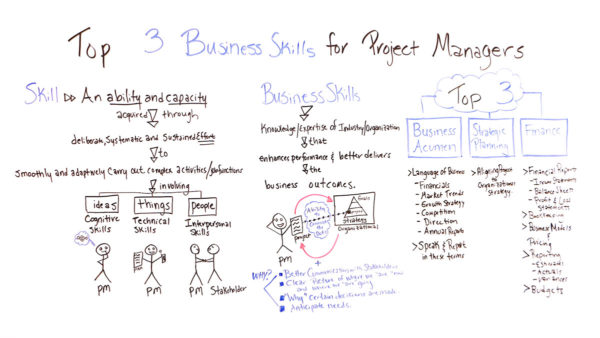What are the business-oriented skills that project managers need to stay competitive in today’s world? Jennifer Bridges, PMP, shows you in this video.
Here’s a shot of the whiteboard for your reference!

In Review: Top 3 Business Skills for Project Managers
More companies expect their project managers to invest in developing business skills. Even the Project Management Institute (PMI), has recently redefined the primary skills required for project management certification.
In short: project managers need to learn business skills.
In the video, Jennifer explored the definitions of core skills needed for people leading a project, specifically these new business-focused skills, which help you to align your project to the organization’s strategy.
The three skills that a project manager must add to their toolbox are:
- Business acumen – Understand the language of business, and how to speak and report to the business leaders in the organization. That includes financials, market trends, growth strategy, competition, direction and knowing what’s in the annual reports.
- Strategic planning – It’s the job of the project manager to make sure the project is aligning with the organizational strategy, even if it shifts during your project.
- Finance – Understanding the goals and needs of the finance department will help you tailor reports that support both of your needs. Make sure you understand how to read and add value to financial reports, including income statements, balance sheets and profit & loss statements. You should also have at least a broad understanding of bookkeeping, business models, pricing (as it pertains to your project or product), and if course, reporting and budgets.
You don’t need to be an expert in these disciplines, but you do need to know enough about the needs of other departments and stakeholders to be able to make sure you are seeking alignment and communication across the organization.
Pro-Tip: A pathway to strategic alignment with your organization is to review all the projects, build a framework around them and then set priorities.
Take it further: Understanding business is going to put you as a project manager in a better position to manage. And if you’re looking for more reasons to align with your company’s strategic plans, read contributor Dave Wakeman’s recent article.
Thanks for watching!
Video Transcription
Today, we’re talking about the top three business skills for project managers. More and more companies are requiring their project managers to invest in and increase their business skills, learn business acumen, and learn to speak the language of business.
But before we start, we want to review what a skill is, and determine the difference between business skills. We also want to talk about the top three business skills, and why they’re so important.
First of all, let’s look at a skill. A skill is an ability and capacity acquired through deliberate, systematic, and a sustained effort to smoothly and adaptively carry out complex activities and job functions. For project managers, they’re involving ideas, like cognitive skills, like learning to plan, do the planning for the project, and things like the technical skills, building a schedule, building a budget.
Also the people and interpersonal skills, learning to deal with your team and manage the conflict among team members to get things done. More specifically, what a business skill is, is the knowledge or deep expertise of the industry or organization that enhances the performance and better delivers the business outcomes.
So that allows the project manager to align their project with the business strategy, and the ability to connect the dots. More specifically, the top three business skills that are helpful for project managers that our companies are looking for, again, are business acumen, strategic planning, and finance.
Business acumen means the language of business, understanding and being able to speak about financials, understanding the market trends, and the growth strategy of the company. Learning more about competition and the direction of the company, and being able to understand and interpret the annual reports. Truly, being able to speak and report in these terms.
The strategic planning has to do with aligning the project to the organization or corporate business strategy. The finance is more about the financial reports, the income statements, the balance sheets, and the profit and loss statements, which drive certain decisions for projects. Knowing bookkeeping and how important that is, and how that feeds the data into these reports, and why it’s important for that to be accurate.
Understanding the business models of the company and the pricing, and how market trends or world events can impact that. And then reporting, understanding the estimates, and why they’re so important to be accurate, the actuals, and variances, and budgets.
So understanding these business terms and having these top three business skills, again, provides the ability to connect the dots between your project in your organization. And why this is so important is, it provides better communication between you as the project manager and your stakeholders, and also provide a clear picture of where we are and where we’re going, and why certain decisions by the company are made. And also allow you to be able to anticipate the needs.
If you need a tool that can help you connect the dots between your project and your business strategy, then sign up for our software now at ProjectManager.

